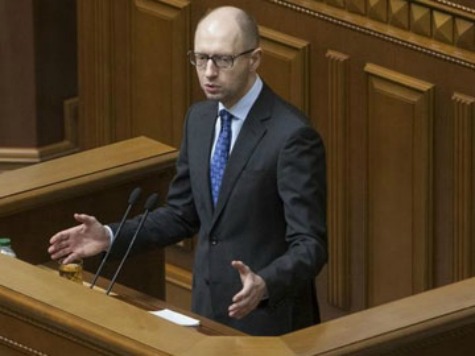
Ukrainian Prime Minister Arseniy Yatsenyuk visited cities in east Ukraine that are facing protests from pro-Russians. He told those in Donetsk, a region that already proclaimed independence from Ukraine, that regions will have more power.
“Executive committers of each region will be handed all financial, economic, administrative and other powers so they control their own territories, giving them the ability to develop these territories to attract investment and receive additional income for each region by amending the budget law of Ukraine,” he said.
“The central government is ready not only for dialogue with the regions, but to meet legal demands and wishes of every resident of the country.”
Different regional leaders offered Yatsenyuk their views.
Donetsk Governor Serhiy Taruta told Yatsenyuk about a plan that would please the protesters and bring peace to the region.
Taruta, a multi-millionaire industrialist, proposed an eight bullet-point plan for the region that emphasizes decentralization as a way to arm him with tools to “fight poverty, corruption, support small and medium-sized businesses, revive industrial production, and develop civil society.”
“In four months, the program will change the attitude of residents,” he said inside the Donetsk Chamber of Commerce.
Ukraine’s Regional Development Minister Volodymyr Groisman agreed major decisions should be within local government.
“Federalization and decentralization are two different recipes,” said Ukraine’s Regional Development Minister Volodymyr Groisman, the former mayor of Vinnytsia in central Ukraine. “We should give local governments more power to set educational and cultural policy, to run their utilities and govern by consensus of decisions on the ground.”
He added that the central government in these matters would serve in a role of observing and controlling that laws are properly carried out.
Kharkiv, Luhansk, and Donetsk mayors Hennadiy Kernes, Serhiy Kravchenko amd Oleksande Lukyanchenko all agreed.
“You must take into consideration all the specific features of each local region and give us the opportunity to serve the people,” he said.
Luhansk and Donetsk mayors Serhiy Kravchenko and Oleksandr Lukyanchenko, respectively, called on Yatsenyuk to give their cities more powers to handle issues on the ground.
“If you don’t get a boycott of the (May 25) presidential election, then amend the constitution to allow us to have local referendums,” said Lukyanchenko.
Kravchenko added: “The Russian language needs to be given official status nationwide…we need to preserve our nation-state.”
These cities have been popular spots for pro-Russians. In fact, on March 13, a pro-Ukrainian rally at Lenin Square in Donetsk was attacked by pro-Russians. Two people died and 11 were sent to the hospital. The attack traumatized the pro-Ukrainians and they are scared to hold protests.
The protesters in Luhansk said they will stay in the security services building until their demands are met. They want the Russian language to be an official language and a referendum.
The east is filled with ethnic Russians and Russian speakers. Many residents, especially the older generation, voiced their desire to break away from Ukraine and rejoin Russia. They want a referendum similar to Crimea’s from March 16. The Black Sea peninsula voted to join the Russian Federation and Moscow made it official on March 21. The people told media how their industrial towns prospered under the Soviet Union and floundered when Ukraine broke away.
After the new government in Kyiv ousted Russia-backed President Viktor Yanukovych, they overturned the law that allowed Russian majority regions to use Russian as their official language. Yanukovych signed the law in 2012.
Moscow told Ukraine they should become a federation in order to protect the Russian speakers. Protecting Russian speakers was their excuse to move into Crimea.

COMMENTS
Please let us know if you're having issues with commenting.